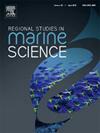Sharing the ocean: Fostering blue synergies for sustainable whale-watching
IF 2.4
4区 环境科学与生态学
Q3 ECOLOGY
引用次数: 0
Abstract
Whale-based tourism activities offer unique opportunities for humans to observe cetaceans in their natural habitats. Well-planned experiences can provide educational value and promote respectful enjoyment of marine wildlife. Conversely, poorly managed activities can negatively impact cetaceans by injuring or killing them (through collisions with boats) or altering their behaviour, such as resting time, nursing or diving. This study presents an example of designing and implementing a whale-based tourism activity in the Canary Islands (Spain), with the participation of researchers, whale-watching operators and tour guides, public policy-makers, and civil society, with a strong focus on educational values. The coastal communities are crucial in promoting sustainable whale-watching practices through educational initiatives, community engagement, and stakeholder collaboration. The paper employs a process-monitoring approach to evaluate the whole procedure of whale-watching activity implementation. We assume that the success of any tourism activity depends on the process that leads to its creation. The analysis emphasizes the need for careful planning and execution to design and implement marine tourism experiences. Concerns for tourism satisfaction and safety and the need for environmental sustainability challenge the management of whale-watching operations. In this regard, engaging local communities, addressing safety and conservation concerns, and promoting responsible tourism practices are essential for mitigating these challenges and ensuring the long-term viability of whale watching as a sustainable and educational activity.
共享海洋:促进可持续观鲸的蓝色协同作用
以鲸鱼为主题的旅游活动为人类提供了在鲸类动物的自然栖息地观察它们的独特机会。精心策划的体验可以提供教育价值,促进人们以尊重的态度欣赏海洋野生动物。反之,管理不善的活动可能会对鲸类动物造成负面影响,如伤害或杀死它们(通过与船只碰撞)或改变它们的行为,如休息时间、哺乳或潜水。本研究介绍了在加那利群岛(西班牙)设计和实施鲸类旅游活动的一个实例,研究人员、观鲸运营商和导游、公共政策制定者和民间社会都参与其中,重点关注教育价值。沿海社区在通过教育活动、社区参与和利益相关者合作促进可持续观鲸实践方面至关重要。本文采用过程监控方法来评估观鲸活动的整个实施过程。我们认为,任何旅游活动的成功都取决于其创建过程。分析强调,在设计和实施海洋旅游体验时,需要精心策划和执行。对旅游满意度和安全的关注,以及对环境可持续性的需求,都对观鲸活动的管理提出了挑战。在这方面,让当地社区参与进来,解决安全和保护问题,推广负责任的旅游做法,对于减轻这些挑战,确保观鲸作为一项可持续的教育活动的长期可行性至关重要。
本文章由计算机程序翻译,如有差异,请以英文原文为准。
求助全文
约1分钟内获得全文
求助全文
来源期刊

Regional Studies in Marine Science
Agricultural and Biological Sciences-Ecology, Evolution, Behavior and Systematics
CiteScore
3.90
自引率
4.80%
发文量
336
审稿时长
69 days
期刊介绍:
REGIONAL STUDIES IN MARINE SCIENCE will publish scientifically sound papers on regional aspects of maritime and marine resources in estuaries, coastal zones, continental shelf, the seas and oceans.
 求助内容:
求助内容: 应助结果提醒方式:
应助结果提醒方式:


